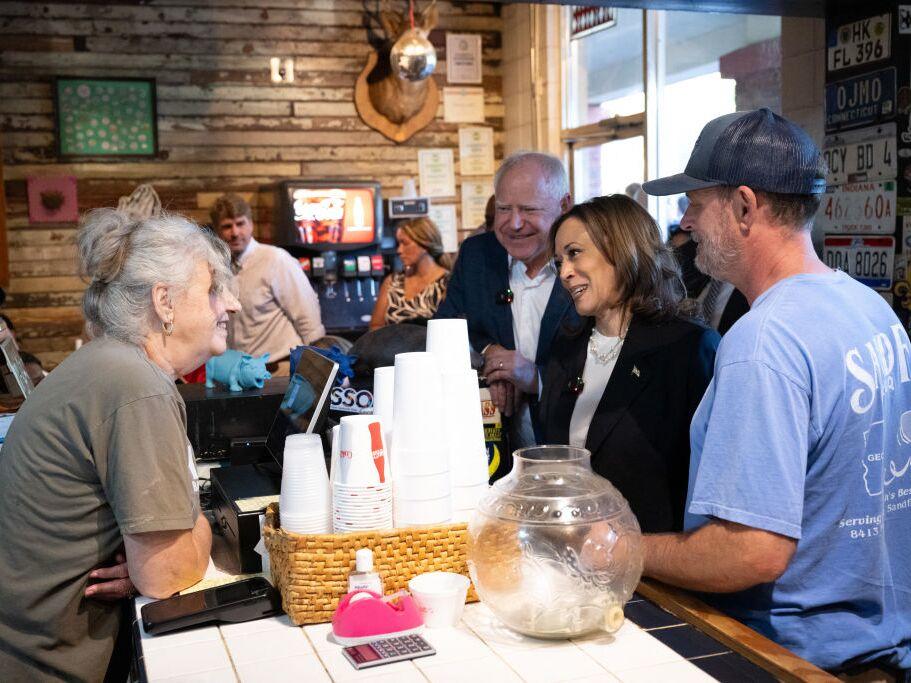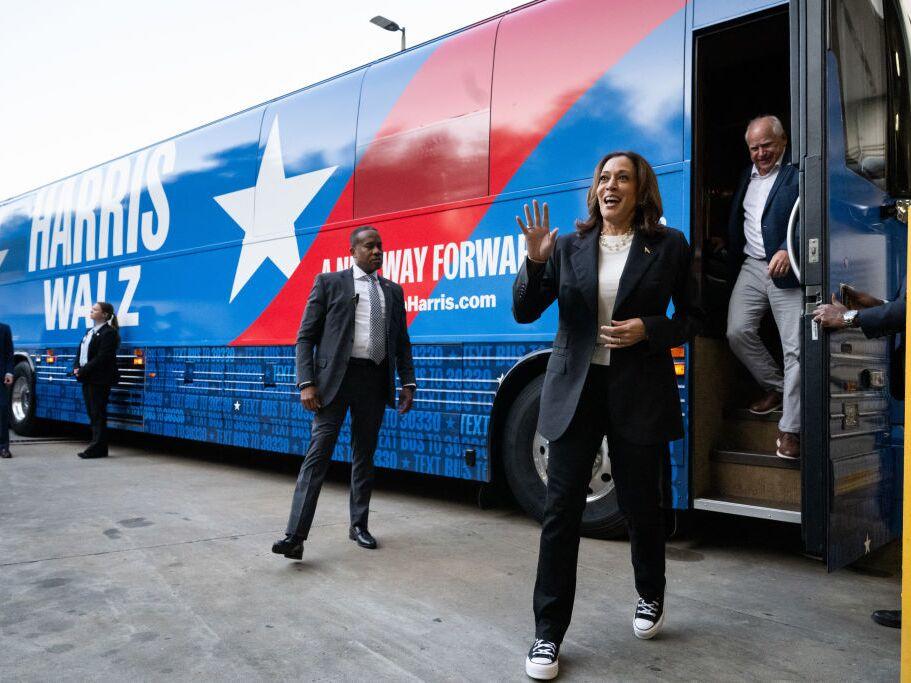Section Branding
Header Content
Harris is on a 2-day Georgia bus tour. It’s the latest sign the state is in play
Primary Content
Vice President Harris and her running mate, Tim Walz, are back on their campaign bus. The pair are together on the campaign trail for the first time since last week’s Democratic convention. This time, they’re on a two-day bus tour of Georgia.
Their trip is taking them into areas of the state that don’t always get attention from Democratic politicians. It will also be the site of Harris’ first major network interview since becoming her party’s nominee for president, on Thursday.
The attention this week is just the latest sign that Georgia, a state President Biden narrowly won in 2020, is once again in play this election year.
Upon arrival in Savannah, Harris and Walz greeted students from Savannah State University, the oldest public HBCU in Georgia, before boarding their campaign bus.
Their first stop on Wednesday was to a marching band rehearsal at Liberty County High School, which, according to U.S. News and World Report, has about 1,000 students, a majority of them “economically disadvantaged.”
The room erupted when Harris and Walz walked in, and the band played the school fight song with football players and cheerleaders in the back of the room. Leaning into his experience as a former coach, Walz gave a quick speech about teamwork. Harris told the crowd they were all leaders in their own way.
Next stop: Sandfly Bar-B-Q in Savannah, a restaurant decorated with license plates from various states. Harris and Walz were greeted by the restaurant's owner, employees and local patrons. Walz sought out a group of teachers and praised their “noble” work. He talked about the importance of optimism and insisted, “Our politics can be hopeful.” Outside, a man held a Trump flag.
“This area is a priority for the campaign: we have nearly 50 full-time staff across 7 offices in South Georgia,” said Porsha White, the Georgia state director for the Harris campaign, ahead of the trip. “This will be the first time a general election presidential candidate will have campaigned in Savannah since the 1990s.”
It’s part of a broader strategy to reach voters in traditionally Republican areas in swing states
Savannah — like most major cities — votes strongly Democratic. But it is swimming in a sea of red — and that’s where Harris and Walz are campaigning.
“The whole point is to overperform,” said Emory University political scientist Andra Gillespie. “And so you want to overperform not just among your base, but you also want to overperform in places where you have historically been weak.”
That means campaigning far from the Democratic strongholds of Atlanta, Philadelphia and Charlotte, N.C., to narrow the margins in parts of those competitive swing states that have typically voted Republican. In other words, losing by less.
In Georgia, where reliably Republican voters still outnumber reliably Democratic ones, that’s really the only way to have a chance at winning.
“Democrats also want to perform better than they historically have in other parts of the state, so you want to be able to post stronger margins — even if they are losing margins — in other parts of the state,” Gillespie said.
Both campaigns put money and time into Georgia
In presidential races, there are two big indicators of how campaigns are feeling about their chances in a state: time and money. Since Harris got into the race, Trump and his allies have spent nearly $33 million on ads in the state, mostly trying to define Harris with pretty negative messaging. Meanwhile Harris and her allies have spent nearly $23 million, mostly on more positive ads introducing her to voters. That’s according to an NPR analysis of data from the tracking firm Ad Impact. People watching TV in Georgia are seeing a ton of campaign ads already.
Today, the Harris campaign launched its first “contrast” ad, hitting Trump and tying him to the unpopular conservative roadmap known as Project 2025. That will be on heavy rotation in Georgia and other swing states.
The Harris campaign has invested in 24 offices around Georgia, including in more traditionally Republican areas. Since Harris started running for president, White says they’ve brought in 35,000 new volunteers.
As for time: Trump held a rally in Georgia earlier this month — though he spent part of his speech bashing the state’s Republican governor. (Trump has since made a public show of saying they’ve worked things out). This week’s bus tour is Harris’ second trip to the state in less than a month.
Polling averages show the race remains close — and it’s much closer with Harris at the top of the ticket than when Biden was the presumptive nominee. Biden won by fewer than 12,000 votes. But the state’s two Democratic U.S. senators are proof that a democrat can win if they run a near perfect campaign.
The Trump campaign will also be turning up the heat in the state this week in an effort to win it back. Georgia Republican Rep. Marjorie Taylor Greene plans to head to a volunteer phone bank in Rome, Ga. In a release she cites “dozens of paid staff, thousands of volunteers, and field offices in every part of the state, from Atlanta to Savannah to the Valdosta. Team Trump will not leave a stone unturned this fall.”
For Trump, Georgia is a must-win state. For Harris, it would open up additional paths to the 270 electoral votes needed to win.
Harris and Walz will take a pitstop in Georgia to do an interview
As Harris and Walz meet voters in person, they are also set to sit down for their first television interview together. CNN’s Dana Bash will interview them, and it will air Thursday night.
For the entirety of Harris’ nascent candidacy, she has been in a position to control the message, and she has largely delivered prepared remarks from teleprompter. The interview is, of course, a different format, where she is likely to be pressed on areas where her position has changed since the Democratic primary in 2020, when she supported some version of Medicare for All, opposed fracking and didn’t have as hard of a line on immigration and border security as she does now.
She won’t be alone. Walz will also be part of the interview, which means there likely will be some questions about their relationship and how they would work together — questions that by their nature are not as perilous as trying to explain policy shifts.
The Trump campaign has been publicly badgering Harris to do an interview, in part because they are looking for something to pounce on where they can actually get some traction. They have been trying unsuccessfully for five weeks to end her campaign honeymoon and make some attacks stick, and this interview is the best chance they’ve had in a while.
Already, Trump’s running mate JD Vance is criticizing Harris and Walz for doing a joint appearance rather than having Harris sit for a grilling alone. But it’s not clear how much voters really care about these intricacies.



